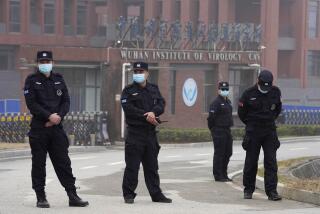MIAs May Have Been Used as Test Subjects in China : Servicemen: A U.S. delegation went to Beijing in May to inquire into the fate of Korean War soldiers.
- Share via
WASHINGTON — The Defense Department has collected evidence indicating that several dozen American servicemen who disappeared during the Korean War were captured and sent to China, where they were subjected to psychological and medical experiments before they died in captivity, The Times has learned.
The preliminary conclusions, based largely on information supplied by an East European military official, prompted the United States to send a high-level American delegation to Beijing in May to question the Chinese.
The Chinese government replied that it has no evidence to confirm the existence of such a facility.
Defense Secretary Dick Cheney, who received the report in April, has turned the report over to the National Security Council and the CIA, which was asked to investigate, sources said.
The East European intelligence source told investigators from the Defense Intelligence Agency that American captives were transferred directly from Korea to a facility believed to have been located in the Manchurian city of Harbin.
At that facility, the report says, American prisoners were subjected to tests designed to determine how regional and racial differences affected their ability to withstand torture and interrogation. A second source said the testing also may have involved germ warfare agents.
The ultimate fate of the American captives is unclear, but the DIA concluded that some were executed after their ordeals and some may have died during the course of the experiments.
One knowledgeable government official called the DIA report extremely preliminary, noting it is based almost exclusively on the uncorroborated claims of a single East European military source, believed to be from Czechoslovakia.
But word of the report could heighten the renewed fervor over the fate of American POWs from foreign wars.
On Thursday, the Senate adopted a resolution, 96 to 0, urging President Bush to order the declassification and disclosure of all government documents and files containing information about POWs and other American servicemen still missing from the Vietnam War. Also endorsed unanimously by the Senate Select Committee on POW-MIA Affairs earlier in the day, the resolution comes on the heels of new allegations that the Pentagon has ignored evidence that some POWs may have been left behind in Southeast Asia at the end of the war.
Maintaining that “over-secrecy” had fueled allegations of a cover-up and deprived Americans of their right to know about MIAs, the panel has been pressing the Administration to agree to declassify all the POW-MIA related documents--numbering in the tens of thousands--held by the Defense Department, the CIA, the DIA and other executive branch agencies.
Although the resolution is non-binding, it could be the prelude to a congressional confrontation with the Administration, if the President refuses to comply with it.
The latest DIA report on the alleged Chinese testing facility claims that officials and scientists from the Soviet Union’s military medical corps were present and participated in the experiments. As a result, the U.S.-Russian Commission on MIA-POWs, headed by former Ambassador Malcolm Toon, has been directed to look into the allegations of Soviet involvement in the facility, one senior Administration official said.
The original orders that established the commission do not, however, refer to any possibility that American captives were held in Soviet-allied territory with Moscow’s knowledge.
One source said the Chinese experiments reportedly focused on distinctions between American blacks and whites, as well as differences in the pain thresholds of servicemen from the American Southeast and North.
The Chinese and the Soviet patrons of the facility were said to be intrigued by behavioral characteristics of Americans from different backgrounds and how those differences could be exploited in the event of war with the United States.
One official said that American officials were uncertain which country--Russia or China--to press for more information, given the uncertainty over the location of the alleged research facility in China and the role allegedly played in it by the Soviet Union and its East European allies.
There is no evidence that any of the Americans who may have been held at the Chinese facility were returned to the United States in prisoner exchanges that took place in 1953 at the end of the Korean War. The Chinese have repeatedly declared that they repatriated all prisoners of war, but the American government has maintained for almost 40 years that the Chinese failed to return some servicemen held captive as political prisoners rather than POWs.
Sen. Robert C. Smith (R-N.H.), vice chairman of the Senate Committee on POW-MIA Affairs, recently released a list of 125 American servicemen in the Korean War, who, he said, appear to have been “interrogated by the former Soviet Union and possibly transferred to China.” Smith said that every one of those named is presumed to be dead.
More to Read
Sign up for Essential California
The most important California stories and recommendations in your inbox every morning.
You may occasionally receive promotional content from the Los Angeles Times.











